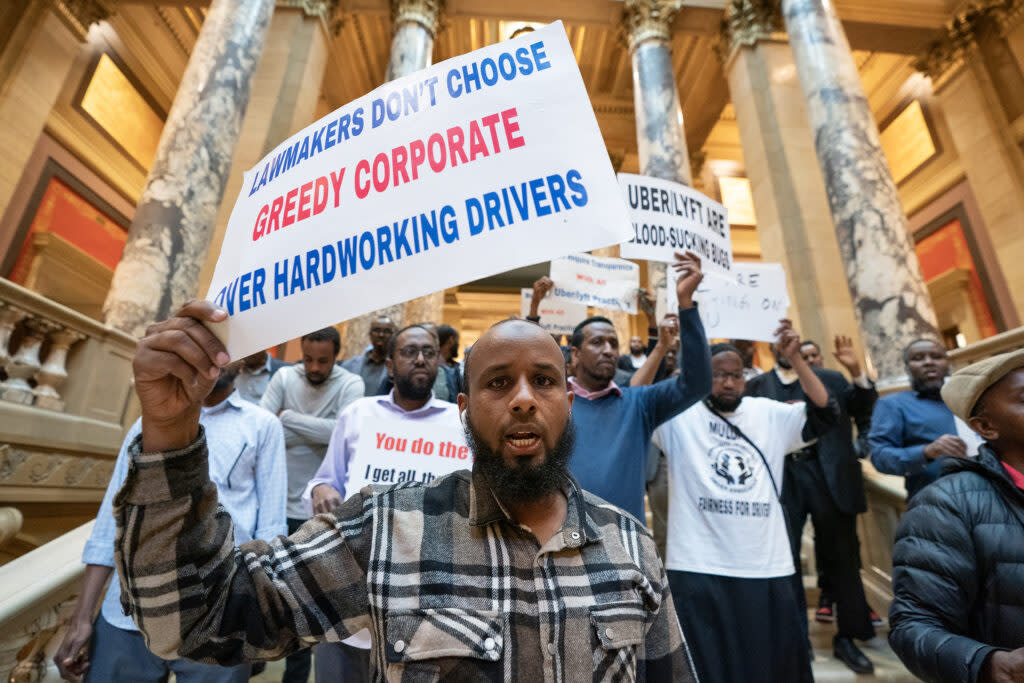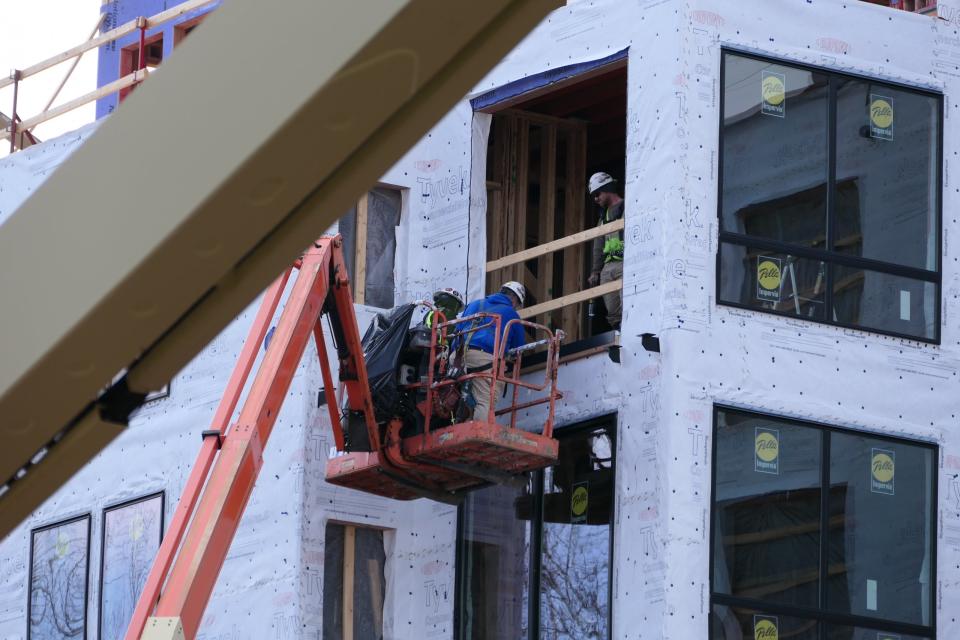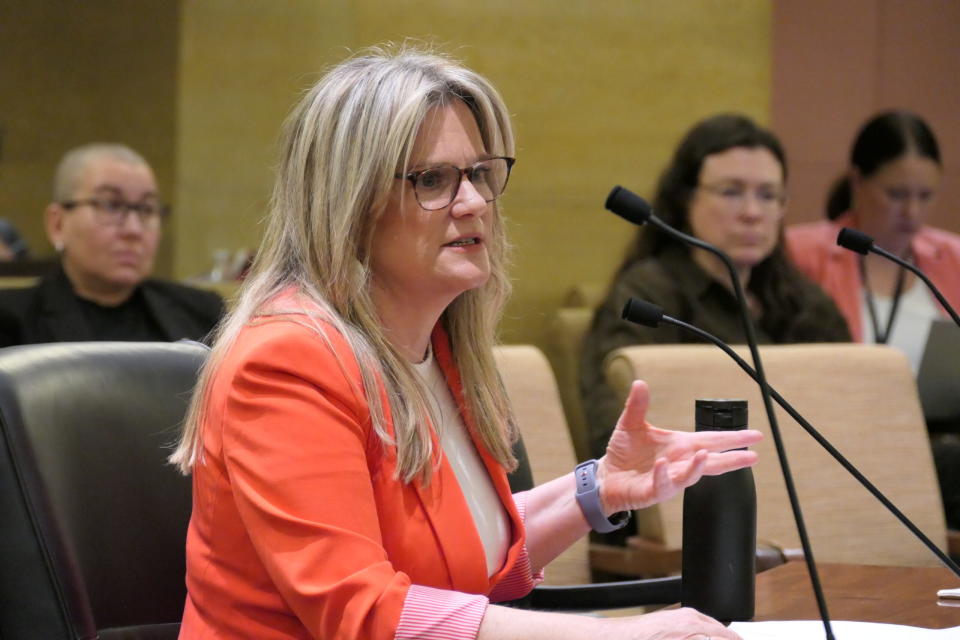What labor bills passed and didn’t in Minnesota this year

A group of rideshare drivers from MN Uber Lyft Drivers Association (MULDA) march around the Capitol building, demanding fair compensation from the transportation network companies Uber and Lyft Thursday, May 16. Photo by A.J. Olmscheid/Senate Media Services.
Take a seat in the Break Room, our weekly round-up of labor news in Minnesota and beyond. This week, Break Room is devoted entirely to what labor policy passed and didn’t this year at the Legislature.
Uber and Lyft drivers will earn more
Minnesota Uber and Lyft drivers can expect their pay to rise more than 14% when a new wage floor takes effect in December (assuming Gov. Tim Walz signs the massive omnibus bill (HF5247) that passed the Legislature late Sunday). The legislation also expands insurance requirements to cover driver injuries, codifies procedures for firing — or “deactivating” — drivers and mandates greater pay transparency.
The bill traveled a rocky road over the past 18 months, dividing both drivers and Democrats over whether to enact minimum rates despite threats by Uber and Lyft to leave the state, or to hammer out a deal with the two ride-hail giants. Ultimately, Democrats came together around a deal supported by the companies that also preempts Minneapolis from enacting the rates the City Council passed earlier this year over the companies’ objections.
The bill allows Uber and Lyft to continue treating drivers as independent contractors without explicitly defining drivers as such, leaving open the possibility for a legal battle over the classification of gig workers down the road.
Employers will face higher penalties for misclassification
Employers will face harsher penalties — up to $10,000 for each violation — for misclassifying employees as independent contractors to avoid paying for minimum wages, overtime, unemployment insurance and workers’ compensation.
The bill empowers all workers — not just construction workers — to sue their employers for misclassification, and the state Department of Labor and Industry will be able to issue stop work orders where violations are occurring, as part of the bill (HF5247) expected to be signed by the governor.
The bill also updates the test used to determine if construction workers are independent contractors and makes it easier for state officials to go after bad actors who try to evade penalties by setting up their companies under new names.
The tougher penalties were pushed by Democrats and trade unions, who argue state regulators need to provide a stronger check on the economic incentives driving misclassification.
Lawmakers also created an partnership between several state agencies that allows them to share information about ongoing investigations.
That corrects a problem laid out in a state audit of worker misclassification, which found agencies don’t share information about their investigations and only seek remedies under their purview. For example, the Department of Employment and Economic Development may only recoup lost contributions to the unemployment insurance fund, while the Department of Revenue only goes after lost tax revenue. Just one agency — the Department of Labor and Industry — seeks restitution for workers who were misclassified.
The intergovernmental group won’t be subject to open meeting laws, which agency leaders cited as a barrier to collaborating on investigations.
Minimum wage carve-outs will be eliminated
Virtually all employees in Minnesota will be entitled to a single state minimum wage starting Jan. 1, when a lower minimum wage tier is eliminated for employees at small businesses, employees under 18 years old and foreign workers on J visas in the hospitality industry. Those workers will see their wages rise by more than $2 an hour to the state’s minimum wage for large employers — $10.85 per hour and set to rise with inflation on Jan. 1. Tips cannot be counted toward the minimum wage.
The new law — included in a package of labor policy signed by the governor (SF3852) — also increases the cap on how much the state minimum wage can rise with inflation from 2.5% to 5%, meaning minimum wage workers will get larger raises in years of high inflation.
A separate proposal to eliminate subminimum wages for disabled workers did not pass. Under a federal program, employers may pay people with physical or mental disabilities around $3.50 an hour — far less than the federal minimum wage. The proposal has supporters and opponents among those close to the issue: Some say the subminimum wages are demeaning, while others worry that people with disabilities will be laid off and further isolated from society.
Employers must post salary ranges
Next year employers will have to include salary ranges in job postings, along with a general description of benefits and other compensation as part of the labor policy law signed by the governor (SF3852). Employers who do not plan to offer a salary range must list a fixed pay rate.
U of M workers will have easier path to unionize
More than 23,000 University of Minnesota employees — including adjunct lecturers, medical residents and student workers — will have a clearer path to unionize under a bill passed by the Legislature.
Most workers form unions based on shared workplaces or similar job duties, but state law explicitly circumscribes 13 possible bargaining units for University of Minnesota workers, including two sprawling groups that are impractical to organize, according to university workers who pushed for the change. For example, one bargaining unit includes more than 5,500 staff across nearly 200 job categories — including over 1,000 instructors, five event planners, a hundred or so librarians and Athletic Director Mark Coyle (whose salary is $1.4 million).
Those workers will soon be able to unionize according to the rules governing other public employees, which directs state labor regulators to consider job duties, geography and desires of the employees when determining a bargaining unit.
Prevailing wage will be required on affordable housing projects
In a significant victory for trade unions, Minnesota will be the first state to require developers to pay prevailing wages on affordable housing projects that receive funds through Low-Income Housing Tax Credits. Prevailing wages largely align with what unions pay and are typically required on publicly funded construction projects — like highways, schools and parks — under the rationale that the government should not put downward pressure on wages.
Democrats also passed new requirements for developers of affordable housing aimed at weeding out contractors with histories of labor violations. The bill requires construction firms to disclose to the public within 14 days of a request any past convictions, labor citations, lawsuits and investigations within the past five years. Developers hiring contractors who have failed to follow wage laws must create wage theft prevention plans and could be banned from receiving state funds for three years if more violations occur.
As a condition of receiving state funding, project developers must hire “responsible contractors” with clean records.
The higher wage requirements will increase the cost of new development amid a housing crunch, while Democrats couldn’t unify around overriding local zoning controls to expand development and reduce costs.
Democratic lawmakers and trade unions also hoped to add prevailing wage requirements on affordable housing projects benefiting from other tax subsidies, as well as local construction projects that are exempted from local sales tax, but those proposals did not pass.
‘Shadow noncompetes’ will be banned
Businesses and customers may not enter into contracts that restrict workers’ employment choices. For example, child care centers will not be allowed to prohibit parents from hiring their teachers, and property maintenance companies will not be allowed to prohibit homeowners associations from hiring their workers. The law was signed by the governor (SF3852) and applies to new contracts starting July 1.
Child influencers will be entitled to compensation
Professional content creators must compensate any minors who appear in their videos regularly — defined as 30% or more of the content — under a law (HF3488) set to take effect July 1, 2025.
The law requires content creators to deposit the minor’s share of the proceeds in a trust account until the child reaches adulthood. When minors are the main creators, all the proceeds must be deposited into their trust accounts. The law prohibits children under 14 years old from working in content creation, but if they do, they are entitled to 100% of the proceeds from the account.
Under the law, children 13 years old and up will be able to demand deletion of profitable content that features them.
The law was inspired by California’s child actor law, called the “Coogan Law” after the star of Charlie Chaplin’s “The Kid.” Jackie Coogan earned millions as a child star only to reach adulthood and find out his parents had spent nearly all his earnings.
Court interpreters will get raises
Minnesota lawmakers funded a 15% pay increase for state-certified court interpreters (HF5216) after an unprecedented seven-week strike forced the court system to postpone hearings and turn to lesser qualified interpreters, sometimes through an expensive phone service.
Yet court interpreters, who are independent contractors and not unionized, say the higher pay of $75 an hour still won’t be competitive with other state courts or the private sector, and the Minnesota Judicial Branch will continue to struggle to uphold its constitutional mandate to provide interpreters to all court participants who are deaf or non-English speakers.
Court interpreters were demanding $96 an hour to match the buying power they had in the 1990s, when they made $50 an hour. That rate barely budged over nearly three decades; state court interpreters were paid $56 an hour until Jan. 8, when new rates increased their pay to $65 an hour.
Workforce development hub will get funding
The state will give $9 million to a nonprofit called Tending the Soil — founded by several labor unions and advocacy groups — to convert the former YWCA Minneapolis in Uptown into a workforce development hub called the Rise Up Center.
The new facility will have classrooms, a public gathering space, and offices for Unidos MN, SEIU Local 26, the New Justice Project, UFCW Local 663 and others. Unite Here Local 17, Centro de Trabajadores Unidos en la Lucha and Inquilinxs Unidxs por Justicia are are also involved in the effort.
What didn’t pass
No bonding: The Legislature failed to pass an infrastructure bill — known as a bonding bill because it uses borrowed money — which typically creates thousands of union construction jobs repairing the state’s roads, wastewater plants and other assets.
No public option: Giving workers without employer-sponsored health insurance the option to enroll in MinnesotaCare was a priority for many Democrats and a number of unions and progressive advocacy groups. Lawmakers didn’t have the budget to fund the first year of the program — planned to start in 2027 — but also didn’t request a federal waiver, a key step toward expanding publicly subsidized health insurance. The proposal faces resistance from Republicans as well as some Democrats who are leery of increasing subsidies to the health care industry without reining in costs.
No unemployment for striking workers: Labor unions wanted the state to extend unemployment benefits for striking workers, which would give unions a significant advantage in protracted work stoppages. New York and New Jersey already allow striking workers to apply for unemployment, with more than half a dozen other states also considering it, according to the Economic Policy Institute.
No new retaliation protections for nurses: Most of the Minnesota nurses union’s “Healing Greed Agenda” failed to pass. That included protections from retaliation for nurses and other direct-care staff who refuse to accept more patients after raising concerns about unsafe staffing levels. The Minnesota Nurses Association, the union representing about 22,000 nurses, also wanted lawmakers to set stricter standards on hospital spending earmarked for the public’s benefit. The union did celebrate lawmakers directing the Office of the Legislative Auditor to investigate nonprofit hospitals’ public benefit spending.
The post What labor bills passed and didn’t in Minnesota this year appeared first on Minnesota Reformer.



